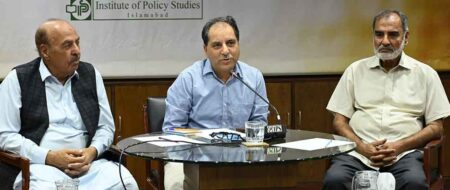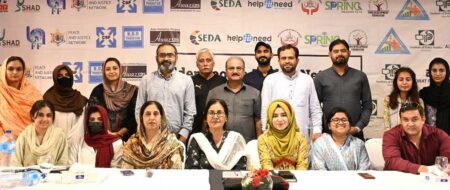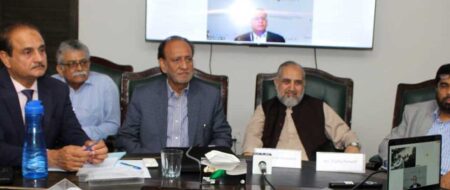Multiculturalism and Islam in Europe: A Case of Norway
Pakistan Norway Friendship Association (PANA) joined hands with IPS in holding a seminar on “Multiculturalism and Islam in Europe: A Case of Norway” on September 07, 2009. Dr. Shireen M. Mazari, Political and Defense Analyst, Atle Hetland, Social and Human Scientist from Norway and Amir Iftikhar Waraich, President PANA spoke on the issue while M. Akram Zaki, former General Secretary Ministry of Foreign Affairs and member IPS National Academic Council chaired the session. Ambassador of Norway to Pakistan H.E. Mr. Robert Kvile were also present in the seminar.
Activity: Public Seminar
Speakers: H.E. Mr. Robert Kvile, Ambassador of Norway to Pakistan; Dr. Shireen M. Mazari, Political and Defense Analyst; Atle Hetland, Social and Human Scientist from Norway; Amir Iftikhar Waraich, President PANA.Chair: M. Akram Zaki, former General Secretary Ministry of Foreign Affairs.
 Dr. Mazari said that European countries attracted the manpower from across the world towards them for getting human resource for their industrial and technological development. “Now Europe is finding it difficult to accommodate the cultures, beliefs and practices that these people carried with them into Europe,” she maintained. The post 9/11 scenario had witnessed increased xenophobia and antagonistic behavior towards Islam and Muslim communities in Europe, she observed, adding “prejudice and discrimination against Muslims has not only been frequent in individual attitudes but is also reflected in national policies and state practice.
Dr. Mazari said that European countries attracted the manpower from across the world towards them for getting human resource for their industrial and technological development. “Now Europe is finding it difficult to accommodate the cultures, beliefs and practices that these people carried with them into Europe,” she maintained. The post 9/11 scenario had witnessed increased xenophobia and antagonistic behavior towards Islam and Muslim communities in Europe, she observed, adding “prejudice and discrimination against Muslims has not only been frequent in individual attitudes but is also reflected in national policies and state practice. She deplored that instead of promoting and protecting multiculturalism Western democracies were requiring members of various ethnic, religious and linguistic communities and representatives of distinct cultures to assimilate into local culture. This marginalization of Muslims in European and American societies had been steering Muslim youth towards sticking harder to their beliefs and protecting their identity, she maintained.
She deplored that instead of promoting and protecting multiculturalism Western democracies were requiring members of various ethnic, religious and linguistic communities and representatives of distinct cultures to assimilate into local culture. This marginalization of Muslims in European and American societies had been steering Muslim youth towards sticking harder to their beliefs and protecting their identity, she maintained. Mr. Atle Hetland said that although the Church did not occupy a central position in individual life in Norway, yet Norwegians by and large associated themselves with Christianity and Christian ethos that lay in the basis of Norwegian culture, he observed.
Mr. Atle Hetland said that although the Church did not occupy a central position in individual life in Norway, yet Norwegians by and large associated themselves with Christianity and Christian ethos that lay in the basis of Norwegian culture, he observed. Highlighting the need to address intra-Muslim divisions among Muslim diaspora, Mr. Amir Iftikhar underlined that Muslims in Norway were not enjoying social and political rights in proportion to their population.
Highlighting the need to address intra-Muslim divisions among Muslim diaspora, Mr. Amir Iftikhar underlined that Muslims in Norway were not enjoying social and political rights in proportion to their population.











